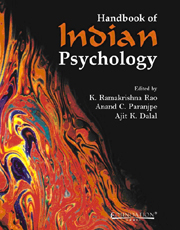Book contents
- Frontmatter
- Contents
- Contributing Authors
- Preface
- 01 Prologue: Introducing Indian Psychology
- 02 Indian Thought and Tradition: A Psychohistorical Perspective
- PART I SYSTEMS AND SCHOOLS
- PART II TOPICS AND THEMES
- PART III APPLICATIONS AND IMPLICATIONS
- 24 Therapeutic Psychology and Indian Yoga
- 25 Towards an Indian Organizational Psychology
- 26 Research on Indian Concepts of Psychology: Major Challenges and Perspectives for Future Action
- 27 Meditative Traditions and Contemporary Psychology
- 28 Consciousness Evolution of the Buddha until He Attained Satori
- 29 William James on Pure Experience and Samādhi in Sāṃkhya Yoga
- 30 Sri Ramaṇa Maharshi: A Case Study in Self-Realization
- 31 Altered States of Consciousness and the Spiritual Traditions: The Proposal for the Creation of State-Specific Sciences
- Pronunciation and Transliteration of Sanskrit Alphabet
- Glossary
- Index
24 - Therapeutic Psychology and Indian Yoga
from PART III - APPLICATIONS AND IMPLICATIONS
Published online by Cambridge University Press: 26 October 2011
- Frontmatter
- Contents
- Contributing Authors
- Preface
- 01 Prologue: Introducing Indian Psychology
- 02 Indian Thought and Tradition: A Psychohistorical Perspective
- PART I SYSTEMS AND SCHOOLS
- PART II TOPICS AND THEMES
- PART III APPLICATIONS AND IMPLICATIONS
- 24 Therapeutic Psychology and Indian Yoga
- 25 Towards an Indian Organizational Psychology
- 26 Research on Indian Concepts of Psychology: Major Challenges and Perspectives for Future Action
- 27 Meditative Traditions and Contemporary Psychology
- 28 Consciousness Evolution of the Buddha until He Attained Satori
- 29 William James on Pure Experience and Samādhi in Sāṃkhya Yoga
- 30 Sri Ramaṇa Maharshi: A Case Study in Self-Realization
- 31 Altered States of Consciousness and the Spiritual Traditions: The Proposal for the Creation of State-Specific Sciences
- Pronunciation and Transliteration of Sanskrit Alphabet
- Glossary
- Index
Summary
My friends, the whole world is a lunatic asylum. Some are mad after worldly love, some after name, some after fame, some after money, some after salvation and going to heaven. In this big lunatic asylum I am also mad, I am mad after God. If you are mad after money, I am mad after God. You are mad; so am 1.1 think my madness is after all the best.
Sri Ramakrishna (Vivekānanda, 1970, pp. 99–100)This chapter reviews the history, aims, and treatment methods of Western psychotherapy, and attempts to assimilate the clinical practise of psychotherapy into the worldview of Indian psychology. After integrating psychotherapy and Indian psychology at the level of theory and mythology, the author proceeds to describe the practical concerns of psychotherapy and suggests ways in which the consciousness perspective of Indian psychology could expand the scope of psychotherapy. Two types of psychotherapy (psychodynamic and cognitive-behavioural) are described in greater detail for readers who may not be familiar with the actual methods and content of clinical practise. Some of the potential dangers of psycho-spiritual practise are discussed as well, including the controversial issue of hostile possession. Finally, existing Indian contributions to psychotherapy are noted and important issues in acclimatizing psychotherapy to Indian culture are highlighted.
Before describing the relationship between Indian psychology and psychotherapy, we must first address some common stereotypes that surround both disciplines.
- Type
- Chapter
- Information
- Handbook of Indian Psychology , pp. 449 - 470Publisher: Foundation BooksPrint publication year: 2008
- 3
- Cited by

